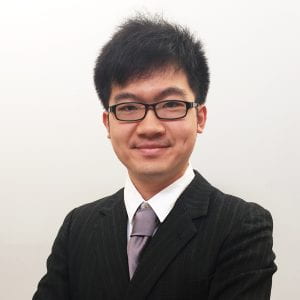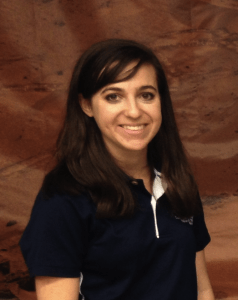| Director | Postdocs and Students (Current and Graduated) |
Jin Xu

Originally from Beijing, China, Jin Xu is a Robotics Ph.D. student at Georgia Tech and a member of the Human-Automation Systems Lab. He is also an NSF Accessibility, Rehabilitation, and Movement Science (ARMS) scholar in Healthcare Robotics, in which he gained fundamental knowledge in biorobotics and received clinical training in the healthcare domain. Jin received a Bachelor’s degree in Electrical Engineering from Georgia Institute of Technology in 2013. His interests broadly involve assistive technology, social robots, and artificial intelligence. His research encompasses rehabilitation robotics, machine learning, and human-robot interaction. In particular, his research at the HumAnS Lab focuses on investigating human-robot trust in time-sensitive and high-risk environments, with a special focus on healthcare and robot rehabilitation scenarios. 
Katelyn Fry

Katelyn Fry graduated from the University of Michigan with a Masters degree from the Robotics department. She also received her B.S. in Electrical Engineering from Clemson University. Her interests are in developing wearable interfaces for identifying kicking pattern differences in infants to help in the early detection of children at-risk for developing a disability.

De’Aira Bryant
 De’Aira Bryant graduated Summa Cum Laude from the University of South Carolina with a Bachelor’s degree in Computer Science and a minor in Mathematics in 2017 and is currently a Ph.D. student in Computer Science at Georgia Tech. De’Aira is a recipient of both the National Science Foundation Graduate Research Fellowship and the National GEM Consortium Fellowship. Adobe Systems, Inc. is her GEM company sponsor where she has worked as an Experience Design and Strategy researcher in the past. De’Aira’s research interests include developing affective intelligent systems designed for realistic healthcare scenarios. In particular, she is interested in applying Artificial Intelligence and Machine Learning techniques to foster anthropomorphic interactions between embodied robotic agents and children during rehabilitative tasks.
De’Aira Bryant graduated Summa Cum Laude from the University of South Carolina with a Bachelor’s degree in Computer Science and a minor in Mathematics in 2017 and is currently a Ph.D. student in Computer Science at Georgia Tech. De’Aira is a recipient of both the National Science Foundation Graduate Research Fellowship and the National GEM Consortium Fellowship. Adobe Systems, Inc. is her GEM company sponsor where she has worked as an Experience Design and Strategy researcher in the past. De’Aira’s research interests include developing affective intelligent systems designed for realistic healthcare scenarios. In particular, she is interested in applying Artificial Intelligence and Machine Learning techniques to foster anthropomorphic interactions between embodied robotic agents and children during rehabilitative tasks.
Brittney English
 Ph.D. student Brittney English had her first experience with robotics the summer after her freshmen year at Georgia Tech. Previous high school internships at Air Force Research Labs at Tyndall Air Force Base in her hometown of Panama City, Florida, sparked her love of science, but work on the Pyrocopter project, a robotic helicopter that shot flaming paint balls in order to do controlled burns in forest areas, ignited her interest in robotics. Brittney English received both her B.S. in Electrical and Computer Engineering from the Georgia Institute of Technology. Her Ph.D. research is focused on the design of an in-home scalable robotic arm and tablet gaming suite for rehabilitation exercises for individuals with neurological disorders.
Ph.D. student Brittney English had her first experience with robotics the summer after her freshmen year at Georgia Tech. Previous high school internships at Air Force Research Labs at Tyndall Air Force Base in her hometown of Panama City, Florida, sparked her love of science, but work on the Pyrocopter project, a robotic helicopter that shot flaming paint balls in order to do controlled burns in forest areas, ignited her interest in robotics. Brittney English received both her B.S. in Electrical and Computer Engineering from the Georgia Institute of Technology. Her Ph.D. research is focused on the design of an in-home scalable robotic arm and tablet gaming suite for rehabilitation exercises for individuals with neurological disorders.
Sergio García-Vergara, Ph.D.
 Originally from Puerto Rico, Sergio García-Vergara graduated magna cum laude from the University of Puerto Rico at Mayaguez with a B.S. degree in Electrical Engineering in June 2011. Sergio has received numerous honors and awards, which include: the NSF Graduate Research Fellowship, ECE Marion & Henry Bourne Graduate Fellowship, Goizueta Foundation Fellowship, member of the Dean’s list throughout his studies, and a recipient of the PR-LSAMP (Louis Stokes Alliance for Minority Program) scholarship. Sergio and a colleague hold a provisional patent for developing a novel and inexpensive system that allows patients with very limited body mobility to use a joystick controlled wheelchair. Sergio completed his Ph.D. in ECE, with a focus in controls and robotics. His Ph.D. research focused in studying the effects of music in the rehabilitation field by combining Virtual Reality games with robotic agents, with the end goal of helping children regain upper body movement.
Originally from Puerto Rico, Sergio García-Vergara graduated magna cum laude from the University of Puerto Rico at Mayaguez with a B.S. degree in Electrical Engineering in June 2011. Sergio has received numerous honors and awards, which include: the NSF Graduate Research Fellowship, ECE Marion & Henry Bourne Graduate Fellowship, Goizueta Foundation Fellowship, member of the Dean’s list throughout his studies, and a recipient of the PR-LSAMP (Louis Stokes Alliance for Minority Program) scholarship. Sergio and a colleague hold a provisional patent for developing a novel and inexpensive system that allows patients with very limited body mobility to use a joystick controlled wheelchair. Sergio completed his Ph.D. in ECE, with a focus in controls and robotics. His Ph.D. research focused in studying the effects of music in the rehabilitation field by combining Virtual Reality games with robotic agents, with the end goal of helping children regain upper body movement.
Kevin DeMarco, Ph.D.
 Kevin DeMarco received both his B.S. (2007) and M.S. (2008) in Electrical and Computer Engineering from the Georgia Institute of Technology. His graduate work in control theory, dynamical systems, and embedded systems led him to accept a position as a Research Engineer at the Georgia Tech Research Institute (GTRI), where he developed embedded systems for the control and monitoring of U.S. Air Force and U.S. Navy Electronic Warfare systems. In the Fall of 2012, Kevin DeMarco became a full-time Electrical and Computer Engineering PhD student at Georgia Tech, where he focused on developing autonomous maritime systems for both surface and underwater robotic platforms. For His Ph.D. thesis, Kevin worked in the domain of Underwater Human-Robot Interaction (UHRI) to enable human-robot teaming. Of particular interest in UHRI was providing the robot a high-level of autonomy, such that the robot could provide assistance to the human by inferring the human’s intent.
Kevin DeMarco received both his B.S. (2007) and M.S. (2008) in Electrical and Computer Engineering from the Georgia Institute of Technology. His graduate work in control theory, dynamical systems, and embedded systems led him to accept a position as a Research Engineer at the Georgia Tech Research Institute (GTRI), where he developed embedded systems for the control and monitoring of U.S. Air Force and U.S. Navy Electronic Warfare systems. In the Fall of 2012, Kevin DeMarco became a full-time Electrical and Computer Engineering PhD student at Georgia Tech, where he focused on developing autonomous maritime systems for both surface and underwater robotic platforms. For His Ph.D. thesis, Kevin worked in the domain of Underwater Human-Robot Interaction (UHRI) to enable human-robot teaming. Of particular interest in UHRI was providing the robot a high-level of autonomy, such that the robot could provide assistance to the human by inferring the human’s intent.

Hae Won Park, Ph.D.
 Hae Won Park received her B.S in Electronic and Electrical Engineering from POSTECH, Korea in 2006. For her thesis project, she built a 52cm 23-DOF Humanoid that could walk and follow objects while avoiding obstacles. She has industry experience at Samsung Electronics, which includes mobile-phone hardware/software development and software testing. Her career in Robotics took a first step at the Korea Institute of Science and Technology as a research scientist in the Center for Cognitive Robotics research group. There she managed projects related to object recognition using local PCA features and multi-modal object learning for home robots. Her Ph.D. research in the HumAnS Lab focused on applying statistical learning techniques and human-robot interaction methodologies for enabling the transfer of knowledge between clinicians, children, and robots to engage children with special needs in therapy games. She continued in the HumAnS as a postdoctoral scholar and shifted her focus to developing a socially interactive robot playmate for engaging children with Autism. Hae Won is also a co-founder of the Georgia Tech startup, Zyrobotics, which is licensing technology based on her thesis work.
Hae Won Park received her B.S in Electronic and Electrical Engineering from POSTECH, Korea in 2006. For her thesis project, she built a 52cm 23-DOF Humanoid that could walk and follow objects while avoiding obstacles. She has industry experience at Samsung Electronics, which includes mobile-phone hardware/software development and software testing. Her career in Robotics took a first step at the Korea Institute of Science and Technology as a research scientist in the Center for Cognitive Robotics research group. There she managed projects related to object recognition using local PCA features and multi-modal object learning for home robots. Her Ph.D. research in the HumAnS Lab focused on applying statistical learning techniques and human-robot interaction methodologies for enabling the transfer of knowledge between clinicians, children, and robots to engage children with special needs in therapy games. She continued in the HumAnS as a postdoctoral scholar and shifted her focus to developing a socially interactive robot playmate for engaging children with Autism. Hae Won is also a co-founder of the Georgia Tech startup, Zyrobotics, which is licensing technology based on her thesis work.

Paul Robinette, Ph.D.
 Paul Robinette doctoral research focused on trust in human-robot interaction scenarios, with a focus on emergency evacuation. He received a BS in Physics (2008), a BS in Computer Engineering (2008) and a MS in Computer Engineering (2010) from Missouri University of Science and Technology. During this time, he did work on S&T’s entry into IGVC, research for the LAGR project and swarm robotics research with Boeing. At GaTech, Paul worked on developing robots to assist in the orderly evacuation of buildings during an emergency for the HumAnS Lab and collaborated with his co-advisor Dr. Alan Wagner from GTRI.
Paul Robinette doctoral research focused on trust in human-robot interaction scenarios, with a focus on emergency evacuation. He received a BS in Physics (2008), a BS in Computer Engineering (2008) and a MS in Computer Engineering (2010) from Missouri University of Science and Technology. During this time, he did work on S&T’s entry into IGVC, research for the LAGR project and swarm robotics research with Boeing. At GaTech, Paul worked on developing robots to assist in the orderly evacuation of buildings during an emergency for the HumAnS Lab and collaborated with his co-advisor Dr. Alan Wagner from GTRI.

LaVonda N. Brown, Ph.D.
 LaVonda Brown graduated Summa Cum Laude with her B.S. in Electronics Engineering from Norfolk State University in Norfolk, Virginia. LaVonda has received numerous honors and awards, which include the Texas Instruments Fellowship, President’s Fellowship, Class Scholar Award, Dean’s Honor Award, and the Dozoretz National Institute for Mathematics and Applied Sciences (DNIMAS) full-academic scholarship. She has industry work experience with Texas Instruments where she worked with the High Performance Analog (HPA) division as a co-op. LaVonda’s PhD research was focused on closing the achievement gap between underserved and majority students by using a Socially Interactive Robot Coach to assist children with Math. She also applied this methodology to the use of a socially interactive robot coach to assist children with motor disabilities in therapy.
LaVonda Brown graduated Summa Cum Laude with her B.S. in Electronics Engineering from Norfolk State University in Norfolk, Virginia. LaVonda has received numerous honors and awards, which include the Texas Instruments Fellowship, President’s Fellowship, Class Scholar Award, Dean’s Honor Award, and the Dozoretz National Institute for Mathematics and Applied Sciences (DNIMAS) full-academic scholarship. She has industry work experience with Texas Instruments where she worked with the High Performance Analog (HPA) division as a co-op. LaVonda’s PhD research was focused on closing the achievement gap between underserved and majority students by using a Socially Interactive Robot Coach to assist children with Math. She also applied this methodology to the use of a socially interactive robot coach to assist children with motor disabilities in therapy.

Chung Hyuk Park, Ph.D.
 Chung Hyuk Park received his B.S. in Electrical Engineering and M.S. in Electrical Engineering and Computer Science from Seoul National University, located in Seoul, Korea. During the MS period, he joined the Robotics and Intelligent Systems Lab and focused his studies in the areas of Haptics and mobile robotics. Then, he worked for LG Electronics Co. participating in several projects of embedded systems and ASIC. His Ph.D. research focused on assistive teleoperation through haptic interaction for individuals with visual impairments. He continued in the HumAnS Lab as a postdoctoral scholar and shifted his focus to developing statistical learning techniques to model surgical behavior for training of medical students through haptic-based inputs.
Chung Hyuk Park received his B.S. in Electrical Engineering and M.S. in Electrical Engineering and Computer Science from Seoul National University, located in Seoul, Korea. During the MS period, he joined the Robotics and Intelligent Systems Lab and focused his studies in the areas of Haptics and mobile robotics. Then, he worked for LG Electronics Co. participating in several projects of embedded systems and ASIC. His Ph.D. research focused on assistive teleoperation through haptic interaction for individuals with visual impairments. He continued in the HumAnS Lab as a postdoctoral scholar and shifted his focus to developing statistical learning techniques to model surgical behavior for training of medical students through haptic-based inputs.

Gregorio Drayer, Ph.D.
 Gregorio Drayer graduated with a Ph.D. in electrical and computer engineering from Georgia Tech, with a minor in aerospace engineering. He developed a human-oriented multi-agent integration methodology for the automation of complex socio-technical systems. Automation, which is characterized by the use of sensors and feedback, is supposed to make human interaction with these systems less difficult. His idea was to make use of sensor and other kinds of information to combine a variety of control actions depending on the operating condition of such systems. His methodology helped operators gain situational awareness, intervene, and reach different levels of automation if necessary. To validate his concepts, he built a small-scale aquatic habitat for experiments related to life support systems. His Ph.D work was sponsored by the first International Fulbright Science and Technology Scholarship awarded to a Venezuelan by the U.S. Department of State.
Gregorio Drayer graduated with a Ph.D. in electrical and computer engineering from Georgia Tech, with a minor in aerospace engineering. He developed a human-oriented multi-agent integration methodology for the automation of complex socio-technical systems. Automation, which is characterized by the use of sensors and feedback, is supposed to make human interaction with these systems less difficult. His idea was to make use of sensor and other kinds of information to combine a variety of control actions depending on the operating condition of such systems. His methodology helped operators gain situational awareness, intervene, and reach different levels of automation if necessary. To validate his concepts, he built a small-scale aquatic habitat for experiments related to life support systems. His Ph.D work was sponsored by the first International Fulbright Science and Technology Scholarship awarded to a Venezuelan by the U.S. Department of State.

Richard A. Coogle, Ph.D.
 Rick Coogle received his B.S. in Computer Engineering (Magna cum Laude) in 2003 and M.S. in Electrical and Computer Engineering in 2006, both from Georgia Tech. Unable to get too much of a good thing, he pursued his PhD in ECE, with a focus on robotics. Prior to returning to Georgia Tech, he spent a year and a half at Lockheed Martin Aeronautics, working on simulations and embedded software. He also worked five years at Northrop Grumman Technical Services, acting as primary investigator in the R&D effort culminating in the Dynamic Test Stand (DTS), an infrastructure for reconfigurable simulation environments, intended for testing real avionics against simulated avionics and aircraft. He also was a lead engineer for an automated testing extension to the DTS. His Ph.D. research, which was a mixture of field, probabilistic, multi-agent, and behavior-based robotics, focused on using multiple agents to map-out ablating target sources (i.e. glaciers).
Rick Coogle received his B.S. in Computer Engineering (Magna cum Laude) in 2003 and M.S. in Electrical and Computer Engineering in 2006, both from Georgia Tech. Unable to get too much of a good thing, he pursued his PhD in ECE, with a focus on robotics. Prior to returning to Georgia Tech, he spent a year and a half at Lockheed Martin Aeronautics, working on simulations and embedded software. He also worked five years at Northrop Grumman Technical Services, acting as primary investigator in the R&D effort culminating in the Dynamic Test Stand (DTS), an infrastructure for reconfigurable simulation environments, intended for testing real avionics against simulated avionics and aircraft. He also was a lead engineer for an automated testing extension to the DTS. His Ph.D. research, which was a mixture of field, probabilistic, multi-agent, and behavior-based robotics, focused on using multiple agents to map-out ablating target sources (i.e. glaciers).

Lonnie Parker, Ph.D.
 Lonnie Parker received his B.S. and M.S. degrees in Electrical Engineering at the Rochester Institute of Technology in 2006, in Rochester, NY. His thesis work was based on the modeling of a ground penetrating radar (GPR) system using a customized MATLAB-based GUI. His varied work assignments in industry include product development at Bosch Security Systems in Munich, Germany, GPR research at the Air Force Research Laboratory in Rome, NY and product marketing at Texas Instruments in Sherman, TX. His interest in robotics was engendered by a summer research program in 2006 at the Georgia Institute of Technology where he worked in the HumAnS Lab as an undergraduate researcher. His Ph.D. research in the HumAnS Lab involved the development of a multi-agent robotic surveying system used for increasing information gain of variable terrain. This increase in collected data was used to aid earth scientists conducting field experiments under harsh conditions.
Lonnie Parker received his B.S. and M.S. degrees in Electrical Engineering at the Rochester Institute of Technology in 2006, in Rochester, NY. His thesis work was based on the modeling of a ground penetrating radar (GPR) system using a customized MATLAB-based GUI. His varied work assignments in industry include product development at Bosch Security Systems in Munich, Germany, GPR research at the Air Force Research Laboratory in Rome, NY and product marketing at Texas Instruments in Sherman, TX. His interest in robotics was engendered by a summer research program in 2006 at the Georgia Institute of Technology where he worked in the HumAnS Lab as an undergraduate researcher. His Ph.D. research in the HumAnS Lab involved the development of a multi-agent robotic surveying system used for increasing information gain of variable terrain. This increase in collected data was used to aid earth scientists conducting field experiments under harsh conditions.

Douglas Antwonne Brooks, Ph.D.
 Douglas Brooks graduated Magna Cum Laude with his B.S. in Electrical Engineering from North Carolina State University in 2005. Douglas has received numerous honors and awards, which include the following: GEM Fellowship, Georgia Tech FOCUS Scholar, and Academic Excellence Award at NC State University. Douglas first joined the HumAnS Lab for his Masters thesis, which focused on the investigation of a navigation control methodology for a wheel-legged robot based on active vision. After completion, he then began his Ph.D. in the HumAnS Lab. His Ph.D. research investigated the use of a socially intelligent robot to assess child-robot interaction, with a focus on movement therapy.
Douglas Brooks graduated Magna Cum Laude with his B.S. in Electrical Engineering from North Carolina State University in 2005. Douglas has received numerous honors and awards, which include the following: GEM Fellowship, Georgia Tech FOCUS Scholar, and Academic Excellence Award at NC State University. Douglas first joined the HumAnS Lab for his Masters thesis, which focused on the investigation of a navigation control methodology for a wheel-legged robot based on active vision. After completion, he then began his Ph.D. in the HumAnS Lab. His Ph.D. research investigated the use of a socially intelligent robot to assess child-robot interaction, with a focus on movement therapy.

Stephen Williams, Ph.D.
 Stephen Williams received a B.S. in Electrical Engineering and a B.S. in Mechanical Engineering from The University of Texas; Arlington, a satellite campus near Dallas. To help fund his education, he worked part time at Chaparral Steel, the third largest structural steel manufacturer in North America, and continued his employment full-time after graduation. After three years in the manufacturing industry, he joined the HumAnS Lab as a Ph.D. student. His Ph.D. research focused on the development of vision-based techniques for the navigation and localization of mobile robots in Arctic terrain.
Stephen Williams received a B.S. in Electrical Engineering and a B.S. in Mechanical Engineering from The University of Texas; Arlington, a satellite campus near Dallas. To help fund his education, he worked part time at Chaparral Steel, the third largest structural steel manufacturer in North America, and continued his employment full-time after graduation. After three years in the manufacturing industry, he joined the HumAnS Lab as a Ph.D. student. His Ph.D. research focused on the development of vision-based techniques for the navigation and localization of mobile robots in Arctic terrain.

Sekou Remy, Ph.D.
 Sekou Remy received his B.S. in Electrical Engineering from Georgia Institute of Technology (2002), B. S. in Computer Science from Morehouse College (2002), and his M.S. in Electrical Engineering also from Georgia Institute of Technology (2004). In the early phases of graduate school, Sekou began the transition from an emphasis on telecommunications to an emphasis on robotics, addressing a deep-seated interest in the so called ‘intelligent agent’. His. Ph.D. research was focused on the development of a learning framework for the transfer of human knowledge to service robots to provide them the ability to learn new tasks.
Sekou Remy received his B.S. in Electrical Engineering from Georgia Institute of Technology (2002), B. S. in Computer Science from Morehouse College (2002), and his M.S. in Electrical Engineering also from Georgia Institute of Technology (2004). In the early phases of graduate school, Sekou began the transition from an emphasis on telecommunications to an emphasis on robotics, addressing a deep-seated interest in the so called ‘intelligent agent’. His. Ph.D. research was focused on the development of a learning framework for the transfer of human knowledge to service robots to provide them the ability to learn new tasks.

Brian Smith, Ph.D.
 Brian Smith graduated with a B.S. from Georgia Tech in 2004 in Computer Engineering with High Honors. During his time at Georgia Tech, he led many groups in robotics projects, as well as performed teaching assistantships in computer science, digital design, and computer architecture courses. His Ph.D. research was joint with his co-advisor Dr. Magnus Egerstedt, and focused on automatic coordination and deployment of multiple-robot systems.
Brian Smith graduated with a B.S. from Georgia Tech in 2004 in Computer Engineering with High Honors. During his time at Georgia Tech, he led many groups in robotics projects, as well as performed teaching assistantships in computer science, digital design, and computer architecture courses. His Ph.D. research was joint with his co-advisor Dr. Magnus Egerstedt, and focused on automatic coordination and deployment of multiple-robot systems.

Antidio Viguria, Ph.D.
 Antidio Viguria was born is Spain where he received his Telecommunication Engineering degree (1999-2004) at the University of Seville being the third best record of his class. Afterwards, he became a Ph.D student at the Department of Ingenier a de Sistemas y Automtica and worked as a researcher in the Robotics, Control and Vision research group directed by Anibal Ollero Baturone. During that time, he was involved in various robotics projects and started studying about multi-robot problems. In July 2006, he obtained the Advanced Studies Diploma (DEA) at University of Seville for his work on distributed task allocation among robots. He matriculated as a Masters student at Georgia Institute of Technology (School of Electrical and Computer Engineering) funded by a Fulbright scholarship. His M.S. thesis was focused on the development and reconfiguration of multi-robotic systems via distributed task allocation methods.
Antidio Viguria was born is Spain where he received his Telecommunication Engineering degree (1999-2004) at the University of Seville being the third best record of his class. Afterwards, he became a Ph.D student at the Department of Ingenier a de Sistemas y Automtica and worked as a researcher in the Robotics, Control and Vision research group directed by Anibal Ollero Baturone. During that time, he was involved in various robotics projects and started studying about multi-robot problems. In July 2006, he obtained the Advanced Studies Diploma (DEA) at University of Seville for his work on distributed task allocation among robots. He matriculated as a Masters student at Georgia Institute of Technology (School of Electrical and Computer Engineering) funded by a Fulbright scholarship. His M.S. thesis was focused on the development and reconfiguration of multi-robotic systems via distributed task allocation methods.

Mason Nixon
 Mason Nixon graduates with a Master’ thesis in electrical and computer engineering at Georgia Tech. He received his B.S. from Auburn University in electrical engineering and wireless engineering graduating summa cum laude (with most high honors) in May 2011. His thesis was focused on developing a virtual reality system to aid in physical therapy of children with cerebral palsy.
Mason Nixon graduates with a Master’ thesis in electrical and computer engineering at Georgia Tech. He received his B.S. from Auburn University in electrical engineering and wireless engineering graduating summa cum laude (with most high honors) in May 2011. His thesis was focused on developing a virtual reality system to aid in physical therapy of children with cerebral palsy.
M.S. Thesis: Utilization of Auditory Cues to Enhance Therapy for Children with Cerebral Palsy

Matt Joseph Livianu
 Matt Livianu graduated from Harvey Mudd College in 2004 with a B.S. in Computer Science. After graduation, he worked for the Raytheon Company SA where he performed signal integrity analysis for space hardware. He then matriculated as a Masters student at Georgia Tech, where he studied systems and controls and computer engineering. His M.S. thesis was focused on using neural networks for human-in-the-loop control of planetary rovers on harsh terrain.
Matt Livianu graduated from Harvey Mudd College in 2004 with a B.S. in Computer Science. After graduation, he worked for the Raytheon Company SA where he performed signal integrity analysis for space hardware. He then matriculated as a Masters student at Georgia Tech, where he studied systems and controls and computer engineering. His M.S. thesis was focused on using neural networks for human-in-the-loop control of planetary rovers on harsh terrain.
M.S. Thesis: Human-in-the-loop Neural Network Control of a Planetary Rover on Harsh Terrain

Bi Ge
M.S. Thesis: Identifying Engagement from Joint Kinematics Data in Robot Therapy Prompt Interventions for Children with Autism Spectrum Disorder

Morenike Ajulo
M.S. Thesis: Interactive Text Response for Assistive Robotics in the Home

Byron Edward Johns
M.S. Thesis: Design and Control of a New Reconfigurable Robotic Mobility Platform

